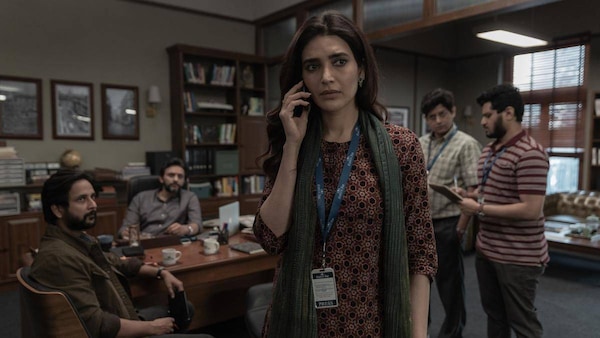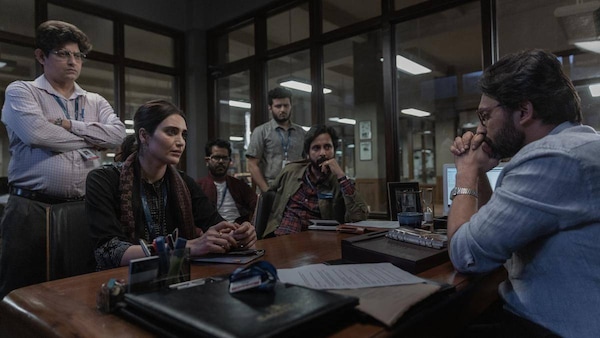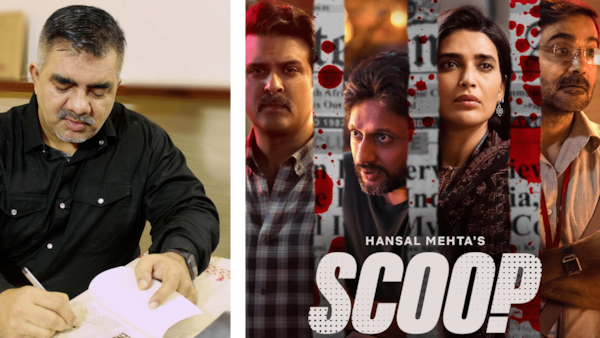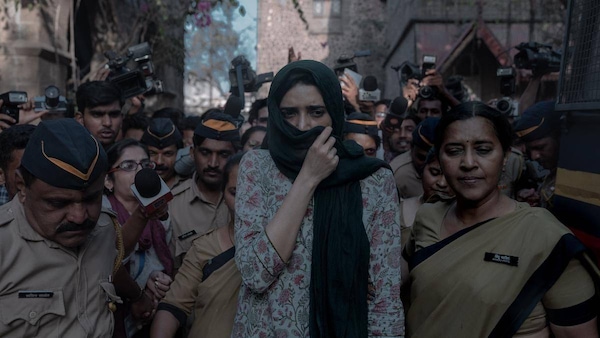'The Media Crucified Jigna Vora': S Hussain Zaidi Writes On Scoop, & The Truth
S Hussain Zaidi revisits the events depicted in Netflix's Scoop, which he was privy to as Jigna Vora's editor and mentor of slain journalist J Dey, and assesses how closely it hews to reality.

Last Updated: 10.23 AM, Jul 04, 2023
S Hussain Zaidi was the resident editor of The Asian Age, Mumbai, at the time when journalist J Dey was murdered, and crime reporter Jigna Vora was arrested, in June of 2011. Those events — the persistent campaign against Vora on flimsy grounds, her incarceration, lengthy legal battle, and subsequent acquittal — have been adapted into the Netflix series Scoop, by Hansal Mehta. In this column, Zaidi — Vora’s editor and Dey’s mentor — writes about his thoughts on watching the show, the points at which it converges and diverges from what actually transpired, and his view of the situation 12 years later.
***
11 JUNE 2023. I switched off the TV after binge-watching Hansal Mehta’s web series, Scoop, on Netflix. I closed my eyes, wiped off a few tears and just sat blankly, realising how many years have passed by. Twelve years. Twelve years indeed.
***
I still remember the phone call that brought me the news of Jyotirmoy Dey (or as I, like many others, called him, “J Dey”) being shot. I rushed to the hospital in Powai. To me, someone like J Dey could not be killed. He was a giant, a Hulk. He had a body no sword could stab, no bullet could pierce. I had seen him working out in the gym, lifting huge weights in the bench press, in squats. Often I would stop working out myself and just see the way he was training, or running or jogging. Thus, on that day for me, it was very difficult to come to terms with the death of such a man.
J Dey died at the age of 57. He came into journalism rather late. Precisely why he was extremely ambitious, he wanted to do a lot of things. He was working on a book at that time and had planned to write several more. He worked very hard, relentlessly, for all those years as a journalist. But his death 12 years ago, and every 11 June since then, makes me extremely emotional. His killing has left a wound inside me that will never heal.
***

J Dey’s killing and Jigna Vora’s imprisonment are both etched in the hearts and minds of people — people who knew them personally/professionally, and those who got to know about them through the vicious reportage that the news media did around them 12 years ago. I knew both of them very closely; I had mentored them into the school of crime journalism. They were both my proteges and gifted colleagues, and I have so many memories with each of them.
What I saw happening to Jigna Vora back then completely broke my faith in humanity. After that, I could not believe that the media could help anyone, or rise against injustice. Until then, even I had thought that the media is the fourth pillar of democracy and that it stands with the truth and brings justice to and for everyone. But after Jigna’s case, I began to see them as opportunists; they are the vultures who have no problem feeding on their own and using them as a platform to meet their own agendas.
The kinds of stories they wrote and published around Jigna are a testimony to that. I remember a prominent broadsheet of Mumbai wrote something to the effect of Jigna being the “kingpin” in J Dey’s killing. Really? Did they ever ask that reporter if they had done their research, their homework properly? They wrote that Jigna sent photographs of J Dey’s bike number plate to Chhota Rajan. You really wanted people to believe that a deputy bureau chief, seven years in the game, will really do that kind of thing to get a colleague killed? More than that, you really thought someone like Chhota Rajan would need a Jigna Vora to find out details about J Dey?
People did not raise these kinds of basic questions before crucifying that woman. And everyone, not just the crime journalists, was having a gala time doing that to her. Even the editors became party to it, and among them were some of those editors from whom I learned journalism, with whom I'd grown as a journalist. So seeing them do this to her was really pitiable, and honestly after that I had no faith in journalism. I soon quit the profession once and for all.
***

People often ask me what had actually transpired during the events that led to J Dey’s death and why, of all people, was Jigna targeted. Is it because she was a successful woman in a male-dominated ecosystem? I would say maybe yes, but only partly. You have to understand that she did not get those Page One stories because she was a ‘good-looking’ woman or anything, but because she was an extremely hard worker. Jigna too had joined this profession in her late 20s or early 30s, while most of her colleagues were in their early 20s, fresh out of college. Hence, she was always in a hurry to make a mark in the field, establish her name. And so she did.
But to say that whatever happened to her was because she is a woman, is a bit of a stretch. There were other women crime journalists too — yes, few and far between, but there were. They were never victimised. I believe Jigna was targeted more because of her peers’ insecurity towards her success.
As for what led to J Dey’s death, I believe that will remain a mystery forever, and there are too many reasons for that. I wouldn’t want to delve deeper into them.
***
Twelve years after these events, watching Scoop was a form of deja vu. I was transported back in time. Seeing those events from the eyes of Imran Siddiqui (editor’s note: the character based on Zaidi, played by Mohammed Zeeshan Ayyub) was like reliving it again…Seeing the colleagues, other newspapers, Jigna — here Jagruti, of course… I have seen all this before, I was in the middle of the entire thing. I had spent a lot of anxious moments. I had seen Jigna crumbling, I'd seen her collapsing when she knew that the net of the media conspiracy was tightening around her. She knew the kind of smear campaign she was being subjected to, and the way colleagues were treating her. And the first three episodes of the show just made me experience that all over again.
When I first started watching the show, I was a bit apprehensive and thought they might make it a little filmi, a bit commercial… try to adopt a popular way of storytelling. But what I found was that they did not think of entertainment as much as they thought of the narrative in the storytelling, which is an aspect of the direction that’s very appreciated. I think Hansal Mehta remained very loyal to the narrative and he did not digress for the sake of entertaining or making people happy, which very few directors would do today.

I would say much of Scoop, whether it is the way the police or the media are depicted, is realistic. These days, most stories on OTT platforms tend to follow a narrative which is a mix of nonlinear-linear. But I thought for Mr Mehta to follow a straightforward linear narrative style was rather a bold step. And they did that without many experiments, so to say. That was really impressive. The characters of Jagruti Pathak (portrayed by Karishma Tanna) and JCP Shroff (Harman Baweja) came out very well.
I have only a few small observations to make on the show: Firstly, the character of Imran Siddiqui. I find him to be very good, intelligent and articulate, but I wish his depiction were not so stereotypical. If at all it was modelled on Jigna's editor, then the man was not really smoking or drinking the way he was shown to be in Scoop.
Secondly, I feel they have not done justice to J Dey’s role. Jyoti was much more than what was shown. It’s quite possible the makers didn’t have enough time or maybe there was paucity of details. But they could have focused more on Jyoti's role and who he was and why people were talking about him the way they were. It was a very brief role and I wish they had shown him more and given more depth to his character.
So far, most Indian films and TV shows have depicted the media in a rather glamourised form. They are shown as either heroic or absolutely corrupt. One hasn’t really seen the true picture of what a newsroom is. After Scoop, I think at least there will be some realism here and we are going to see the way actual journalists and media houses work.
Hussain Zaidi's latest book R.A.W. Hitman: The Real Story of Agent Lima is being published by Simon & Schuster in July 2023.
